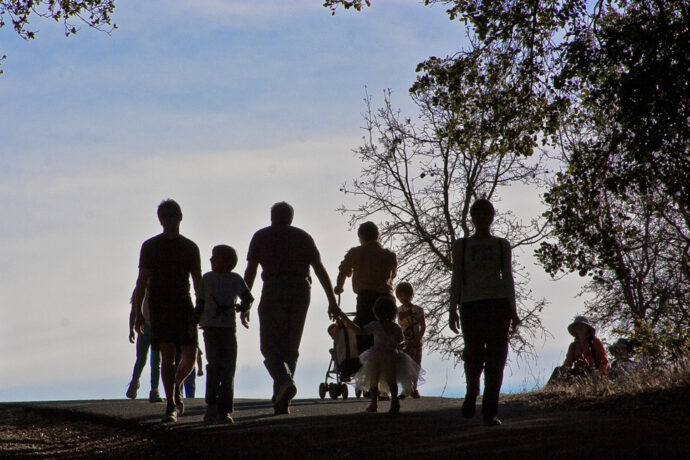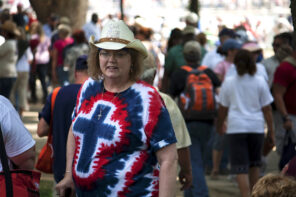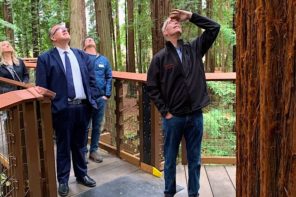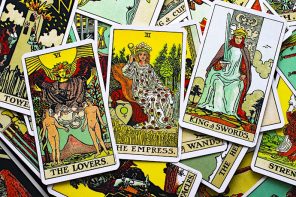What inspired you to write Losing Our Religion: How Unaffiliated Parents Are Raising Their Children?
It was really my daughter’s questions that got me started with this. Sheila was three years old—that age when kids will ask why, why, why about everything. She started asking questions about religion. I remember driving home from preschool in December, and she spotted a giant plastic Santa in somebody’s front yard.
“Mommy,” she asked, “Why does Santa come every year?”
“To make people happy.”
“Why does he want to make people happy?””
“Because it’s Christmas.”
“But why does he want to make people happy on Christmas?”
I had to stop and think. If I say that’s the day when Jesus was born, then the next question will be, who is Jesus? And how do I answer that one? I’d left Christianity years ago, so it felt hypocritical to tell her something I didn’t believe. But then again, Christianity had been such a rich and wonderful part of my own childhood, and part of me felt guilty to not provide what my mother had given to me. So I started talking to other non-religious parents—and later, with help from grant funding, to parents all over the country—and realized I was not alone in my predicament.
The growth of the Nones has been called the decade’s biggest story about religion in America. Americans, especially young people, are leaving organized religion in record numbers. There are now more Nones than there are Catholics in the U.S. population, and one third of those under 30 say they have no religion.
When I began this project ten years ago, most people writing about the Nones seemed to assume the story was temporary: that today’s Nones would be like the baby boomers a generation ago, many of whom dropped out of church in their youth but eventually returned to church or synagogue when they married and raised their own families. But nobody was doing the research to find out if that was actually the case. I decided I would take that on.
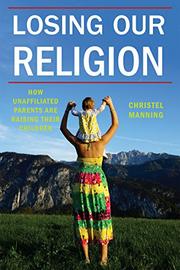
Losing Our Religion: How Unaffiliated Parents Are Raising Their Children
Christel J. Manning
NYU Press
(November 28, 2015)
What’s the most important take-home message for readers?
The key message of this book is that the surge in the None population is not merely a temporary rejection of organized religion, but neither is it necessarily about secularization. Being a None is really about choice. Americans, especially the younger generation, are asserting their right to choose their own worldview rather than having somebody else (their family, an organization, a tradition) define it for them. And it is this choice they seek to pass on to their children.
The term None comes from survey research—when they ask people what is your religious preference, and the respondent says “none,” or “nothing in particular”—but when you actually talk to the unaffiliated, you find they span a wide spectrum, ranging from deeply religious to very secular. Many Nones adhere to a secular philosophy of life. There are also unchurched believers, like Jefferson Bethke of YouTube fame, who “love Jesus but hate religion.”
There are spiritual seekers who embrace bits and pieces of various traditions and don’t want to commit to just one. And there are Nones who are just plain indifferent to religion. What ties these diverse worldviews together is a deep commitment to what I call “worldview choice”—a belief that religious and secular worldviews are expressions of deeply personal experiences, and therefore the individual has a right to choose one, or a combination, that best suits him or her.
This is why None parents will not necessarily raise their children to be non-religious. In contrast to churched parents who usually transmit their own religion to their children, None parents insist they want their children to choose for themselves. That means providing options, and parents go about this in many different ways. I describe the five most common strategies in the book. But what I found most striking was how deeply committed Nones were to the choice narrative. Some even went so far as to follow their children’s lead, providing religious education to a child who seems spiritually inclined while allowing a disinterested child to grow up secular! Is there anything you had to leave out?
Is there anything you had to leave out?
I heard many interesting, often moving stories from None parents, and not all of them could be included in the book. The book draws on existing survey data as well as my own qualitative research, observing and interviewing parents in various settings all over the country. As I recorded and analyzed parents’ diverse experiences, and reflected on their meanings in light of broader cultural patterns, a bigger story began to emerge. In writing that story, I selected narratives and quotes that illustrate it most clearly or compellingly. I also wanted to avoid repetition, so inevitably that meant leaving some things out.
What are some of the biggest misconceptions about your topic?
Well, I already alluded to the common perception of Nones as secular when they are actually very diverse, and the expectation that they would raise their children to be non-religious when they are actually raising them to choose for themselves.
Another common misconception, and one that causes concern among None parents, is that it’s better for children to be raised with religion. The evidence is actually very mixed. For example, many studies show that a high level of involvement with organized religion correlates with positive outcomes for youth such as less experimentation with sex, drugs and alcohol, lower juvenile crime rates, etc. But we don’t know if it’s religion that benefits kids, or just being part of an organized community with other caring adults who regularly interact with your child. As the secular movement continues to organize and institutionalize, it is building more of the kinds of communities that support families in similar ways as religion has.
Existing studies of religion’s benefits also don’t adequately sample secular families. They typically compare people who are highly engaged with organized religion with those who are less engaged, ignoring people who have replaced religion with something they find better, such as faith in humanity, nature, or oneself. In the few studies that attend to this, children have very positive outcomes, sometimes better than their religious peers (e.g., they are more resistant to peer pressure and more sensitive to cultural differences).
From what we know now, it appears that both religious and secular upbringing can have benefits and risks for children. Growing up with religion may cause a teenager to refrain from drinking alcohol and wait longer before having sex, but the secular teen may be less conformist and more tolerant of others. Which is a better outcome is going to depend on your value system.
Did you have a specific audience in mind when writing?
I wanted to write a book that would be of value to other parents like me. I started the project because I had questions about how I should raise Sheila and because I was wondering how other non-religious people are raising their children. As I talked with more and more None parents, I realized that many had similar questions. So it seemed natural to address my writing to them. That’s why the book employs a conversational style and interweaves my own story with that of others. It’s also why I included a couple of chapters addressing practical questions that many None parents have.
But I’m also a sociologist of religion, and NYU is an academic publisher, so my research was subject to peer review. This is the first research-based book about None parents, and it’s filling a real gap in the literature that I hope will be of interest to scholars as well as others interested in understanding the Nones, such as clergy, policymakers, or media persons.
Are you hoping to just inform readers? Entertain them? Piss them off?
My main goal is to inform readers. At one level this means answering basic questions that people have about None parents. Who are they? Why did they leave religion? What do they believe and practice instead? What do they want to pass on to their children, and what options are available to them? What are the challenges of letting your children choose? What is the impact of raising children with or without religion?
But the book also reflects on this information, raising bigger questions that may challenge the reader. Americans tend to assume that choice is good. Does this mean that more choice is better, especially in religion? What are the benefits and risks of our culture’s ever-intensifying orientation towards personal choice? Is this good for individuals or for society? Is it really possible for children to choose their own worldview? There is considerable debate on these questions, and I have tried to give voice to a variety of perspectives. One reviewer called the book “refreshingly non-polemical,” so I feel hopeful that I will not be pissing anybody off.
What alternative title would you give the book?
I had considered several titles that focus on choice, such as Losing our religion—or choosing for ourselves? A good title has to grab the reader’s interest and include key search terms like “unaffiliated parents” and “raising children,” plus you don’t want it to be too long. The current title does all that, so I’m happy with it.
How do you feel about the cover?
Love it. NYU Press invited me to have input, and this was the image I liked best. Mountains and sky are good symbols of spiritual journey, and the person climbing is carrying a child. Because we see only their backs, they can stand for anyone.
Is there a book out there you wish you had written? Which one? Why?
One of my favorite books related to religion is Daniel Everett’s, Don’t Sleep, There are Snakes. Everett and his wife and children spent years living among the Piraha, a small tribe of Amazonian Indians in central Brazil. The Piraha have no counting system, no fixed terms for color, no concept of war, and no personal property. When he arrived in Brazil, Everett was a Christian, and his research funding came from a Christian organization, so while he sought to understand the tribe’s language and its cultural implications, his real goal was to convert them to Christianity. The book describes how he changes in the process (and eventually loses faith in the God he’d hoped to introduce to them) and how his presence and that of other outsiders influences the tribe. It’s part memoir, part scientific exploration, and a beautiful illustration of how we learn from the people we study.
What’s your next book?
I am currently co-editing a volume of essays on organized secularism in America, which will be published by DeGruyter about a year from now. Not sure what my next big project will be. One topic that really interests me is secular worldviews among the elderly. Older people are much less likely to be secular than the young, and there’s a common assumption that the proximity of death and loss of loved ones will bring many non-religious elders back to religion. From what I know anecdotally, that isn’t necessarily the case, but it would be interesting to test it out. I would also like to explore how secular elders think about death as well as life and love and morality.


